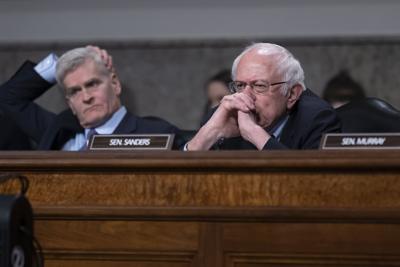WASHINGTON — U.S. Sen. Bill Cassidy apologized last week for being “a skunk in the room.”
But he thought preserving the process for striking bipartisan deals in an era of polarized politics was more important.
Cassidy, R-Baton Rouge, and Sen. Bernie Sanders, I-Vermont, had a carefully crafted deal that would be supported by Republicans on the Senate’s health committee and in the full Senate, where 10 of the 49 Republicans need to vote “yea” to ensure passage of a law aimed at lowering prescription drug prices.
The deal specifically excluded policies that Sanders wanted to add at the last minute through four amendments, said Cassidy, one of the few lawmakers willing to cross the aisle to negotiate in a Congress whose members value intransigence.
Cassidy said he agreed with the substance of most amendments offered minutes before the scheduled committee vote. That’s not the point.
As chair of the health committee, Sanders should have made clear that a deal is a deal and he would abide by the compromise. Sanders had not, said Cassidy, who as ranking member is leader of the Republicans on the Senate Committee on Health, Education, Labor and Pensions committee, called HELP.
“At some point, process matters,” Cassidy told his HELP committee colleagues Tuesday. “The chair seems to incline to abandon a carefully balanced, bipartisan piece of legislation we negotiated over the last several weeks.”
Sanders responded that every member of the committee had a right to offer amendments. “I have disagreements with Sen. Cassidy on his characterization of what happened, period,” he said.
The amendments included changes to existing law that would, in part, lower prices by getting generic drugs on the market faster.
For instance, existing law requires that after a patent expires, the company making a copycat get the concentrations of the ingredients correct before the Food and Drug Administration can allow its sale.
A generic manufacturer needs to nail the proportions of active ingredients. The FDA is forbidden from correcting the concentrations of inactive ingredients.
This often leads to repeated applications that Sen. Rand Paul, R-Kentucky, calls playing “a guessing game with the regulator.”
During the delay, the pharmaceutical developer can, and does, raise the price of their innovation, Paul said. The price of Restasis, developed to treat dry eye, increased 200% while the generic maker tried to get the formula just-so for FDA approval, he added by way of example.
The proposed amendment would allow the FDA to help by identifying the correct portions of inactive ingredients in some cases.
Cassidy said he had voted for a similar bill in previous years. But the complex issue was not included in the Sanders-Cassidy pact because of the huge controversy surrounding whether a federal regulator should tell a secondary manufacturer how to correct the formula.
“I’m kind of having a hard time understanding why this gang can’t shoot straight,” Sen. Mitt Romney, R-Utah, told Sanders. “We all support these amendments and yet you have an agreement with the ranking member that hasn’t been followed through.”
Virginia Sen. Tim Kaine, a Democrat, said he didn’t “want to blunder into it” by putting HELP members in a position of voting against amendments they otherwise would support. He asked that the vote be postponed.
Sanders initially disagreed but eventually called a recess. About an hour later, the committee reconvened and agreed to revisit the vote on Thursday, May 11. “Are we all happy?” Sanders asked before adjourning the committee.
No doubt the incident opens Cassidy to more criticism that working with partisan opponents is futile — particularly in a Congress that relies on its majority in a particular chamber to push through policies without any consideration for the other side.
Longtime Louisiana conservative radio talk show host Moon Griffon has called Cassidy “Psycho Bill” since the senior senator crossed the aisle to vote for impeaching Donald Trump and continued using the nickname during seemingly nonstop derision of Cassidy’s work on getting President Joe Biden’s $1.2 trillion Infrastructure Investment and Jobs Act passed into law.
Cassidy said after the hearing that likely criticisms aside, he took solace from Democrats and Republicans agreeing with him that process is important.
“Keeping your word matters. If you make a deal, you stay with the deal,” Cassidy said after the hearing. “If that was not the case there would be no hope of negotiating anymore in the coming Congress. I think that episode strengthened my ability to talk frankly to colleagues.”

